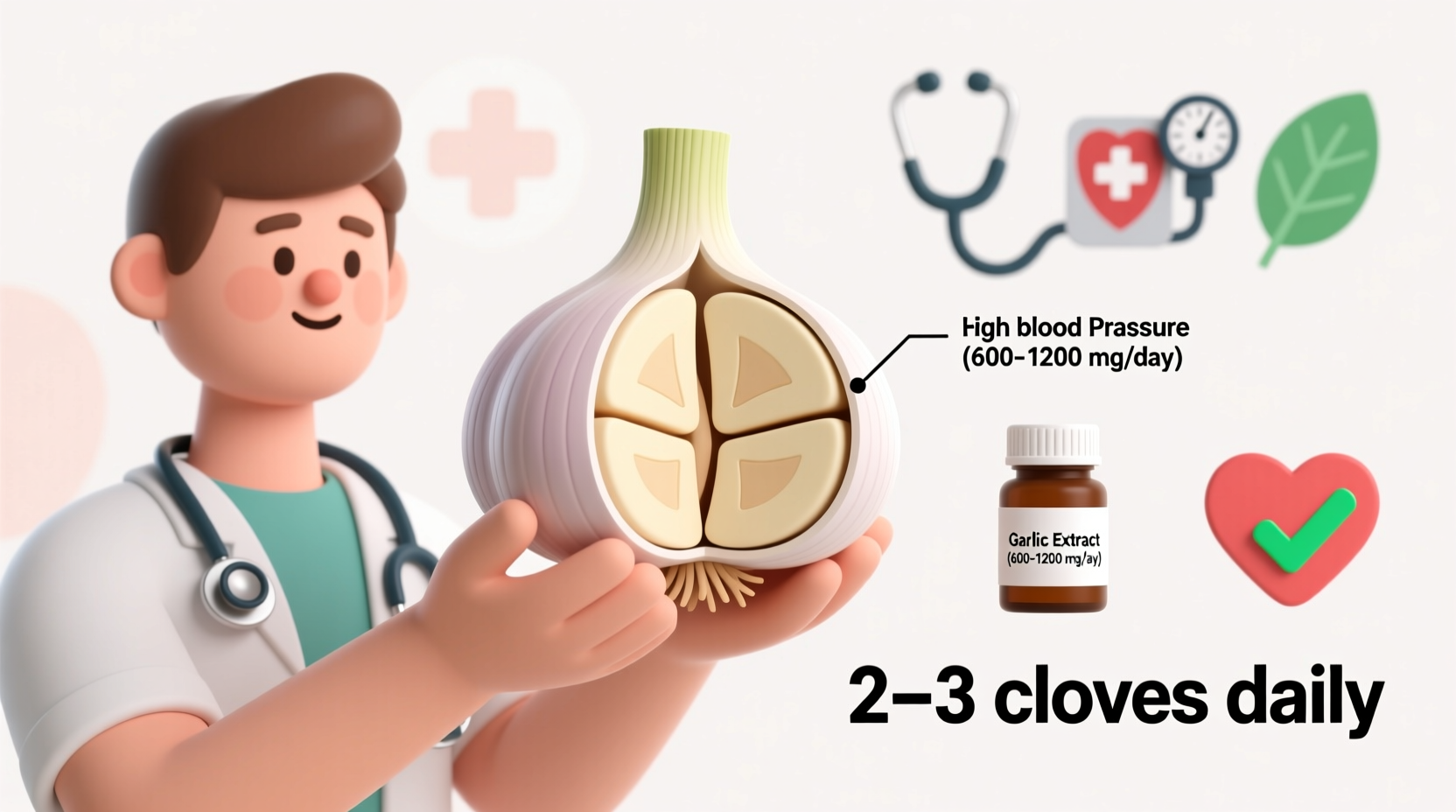Discover how garlic can complement your blood pressure management strategy with evidence-based guidance that prioritizes your safety and health outcomes. This guide cuts through conflicting information to deliver clear, research-supported recommendations you can trust.
Understanding Garlic's Role in Blood Pressure Management
Garlic contains allicin, a bioactive compound that may help relax blood vessels and improve circulation. According to the National Center for Complementary and Integrative Health, multiple clinical studies indicate garlic supplementation can produce modest reductions in blood pressure, particularly for those with hypertension.
Research published in Experimental and Therapeutic Medicine (2020) analyzed 12 randomized controlled trials involving 553 participants. The meta-analysis concluded that garlic preparations significantly reduced both systolic and diastolic blood pressure compared to placebo, with the most consistent results appearing after 8-12 weeks of regular use.
Garlic Dosage Guidelines: What the Research Shows
Different garlic preparations require different dosing strategies. The following evidence-based recommendations come from clinical trials and systematic reviews:
| Garlic Form | Recommended Daily Dosage | Active Compound | Research Support Level |
|---|---|---|---|
| Raw garlic | 1-2 cloves (4-8g) | Allicin (5-18mg) | Moderate |
| Aged garlic extract | 600-2,400 mg | S-allyl cysteine | Strong |
| Garlic powder | 600-1,200 mg | Alliin (3.6-7.2mg) | Moderate |
| Garlic oil | Not recommended | Diallyl sulfides | Low |
The American Heart Association emphasizes that while garlic shows promise as a complementary approach, it should never replace prescribed hypertension medications. Their position statement notes that lifestyle modifications and medication remain the cornerstone of effective blood pressure management.

How Long Until You See Results?
Understanding the timeline for potential benefits helps set realistic expectations. Based on clinical evidence:
- Weeks 1-4: No significant blood pressure changes typically observed
- Weeks 5-8: Some individuals may notice modest reductions (3-5 mmHg)
- Weeks 9-12: Maximum potential benefit observed in clinical studies (8-10 mmHg reduction)
- Beyond 12 weeks: Benefits generally plateau; continued use maintains effects
A 2019 study in Medicine followed participants taking 1,200 mg of aged garlic extract daily for 12 weeks. Researchers noted the most significant reductions occurred between weeks 8-12, with average systolic reductions of 11.8 mmHg and diastolic reductions of 5.3 mmHg among hypertensive participants.
Practical Implementation Strategies
Consistency matters when incorporating garlic into your blood pressure management plan. Consider these evidence-based approaches:
Optimal Timing and Consumption Methods
For raw garlic, crush or chop cloves and let them sit for 10 minutes before consuming to maximize allicin formation. Consuming garlic with food reduces gastrointestinal side effects while maintaining efficacy. Dividing daily doses (e.g., 600 mg twice daily) may provide more consistent blood levels of active compounds.
Food Pairing Considerations
Combine garlic with other heart-healthy foods for synergistic effects:
- Pair with lemon juice to enhance absorption of garlic compounds
- Add to olive oil-based dressings for improved bioavailability
- Combine with leafy greens rich in nitrates for vascular benefits
- Avoid consuming with iron supplements, which may reduce effectiveness
Critical Safety Considerations
Garlic supplementation isn't appropriate for everyone. Understanding these limitations protects your health:
Medication Interactions
Garlic may interact with several common medications:
- Blood thinners: Garlic enhances the effects of warfarin and other anticoagulants, increasing bleeding risk
- HIV medications: May reduce effectiveness of saquinavir and other protease inhibitors
- Blood pressure medications: Could cause excessive lowering when combined with conventional treatments
The U.S. Food and Drug Administration recommends discussing any supplement use with your healthcare provider, especially when managing chronic conditions like hypertension.
Who Should Avoid Garlic Therapy
Certain populations should exercise caution or avoid therapeutic garlic doses:
- Individuals scheduled for surgery within 2 weeks (increased bleeding risk)
- Those with bleeding disorders like hemophilia
- People with garlic allergies (rare but possible)
- Pregnant women beyond normal culinary use
When to Consult Your Healthcare Provider
Garlic supplementation should complement—not replace—conventional hypertension treatment. Schedule a consultation with your healthcare provider if:
- Your blood pressure remains above 130/80 mmHg despite lifestyle changes
- You experience side effects like heartburn, bad breath, or digestive issues
- You're taking medications that may interact with garlic
- You're considering replacing prescribed medication with garlic
Regular blood pressure monitoring remains essential. The American Heart Association recommends checking your blood pressure at least twice daily when making therapeutic changes to track progress accurately.
Frequently Asked Questions
Can garlic lower blood pressure immediately?
No, garlic does not lower blood pressure immediately. Clinical studies show effects typically develop gradually over 8-12 weeks of consistent daily use. Acute blood pressure changes require medical intervention, not dietary supplements.
Is raw garlic better than supplements for high blood pressure?
Research suggests aged garlic extract provides more consistent results than raw garlic due to standardized active compounds. Raw garlic's effectiveness varies based on preparation method and individual digestion. Supplements offer precise dosing that's difficult to achieve with culinary use alone.
How much raw garlic equals a garlic supplement dose?
One average garlic clove (4g raw) contains approximately 5-18mg of allicin, while a standard 600mg garlic powder tablet contains about 3.6mg of alliin (which converts to allicin). Therefore, 1-2 cloves of raw garlic roughly equals a 600mg garlic supplement dose, though bioavailability differs between forms.
Can I take garlic with my blood pressure medication?
You should consult your healthcare provider before combining garlic with blood pressure medication. While some people safely use both, garlic may enhance medication effects, potentially causing excessively low blood pressure. Your doctor can monitor your response and adjust medication doses if needed.
What's the maximum safe daily garlic dosage?
Most clinical studies use doses up to 2,400 mg of aged garlic extract daily without significant adverse effects. However, doses exceeding 0.25g/kg body weight may cause gastrointestinal issues, bad breath, and increased bleeding risk. Always start with lower doses and increase gradually under medical supervision.











 浙公网安备
33010002000092号
浙公网安备
33010002000092号 浙B2-20120091-4
浙B2-20120091-4